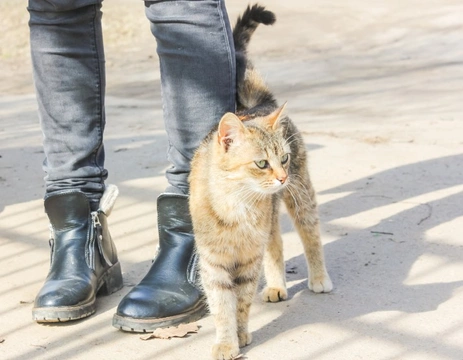
Why do cats seem to deliberately get underfoot?
Most people who have owned a cat for any length of time have tripped over their cat – or at least had a near miss – on at least one occasion, and many of us have become exasperated by our cats’ seemingly absent sense of self preservation when it comes to keeping themselves from harm in this respect.
Tripping over your cat because they’re underfoot on the stairs, winding themselves around your legs or have simply thrown themselves down in front of you is something that most of us instinctively learn to avoid through experience, either of taking a tumble or accidentally knocking the cat and generating a yelp or hiss.
If you’ve ever secretly wondered if your cat is plotting your early demise, you’re not alone – but rather than trying to bring about your untimely departure from this mortal coil, your cat’s tendancy to get underfoot in this way means something entirely different in cat terms.
If you want to know what your cat is thinking when they get underfoot, wonder no more – in this article, we will examine what your cat is really doing when they do this. Read on to learn more.
Scent marking
Cats have scent glands on the sides of their faces, and when your cat headbutts you or rubs their head against you, they are transferring their scent onto you – essentially, marking their territory. Cats like everything within their territory to smell familiar, and like them – and if you get a new item of furniture, your cat is likely to view it with some caution and suspicion until they have marked it to make it theirs, much as they will often rub your legs for the same reason.
Cats are particularly likely to wind around your legs and infuse you with their scent when you’ve just got back home and smell different, and when you first come in, you might give your cat a stroke but then busy yourself with settling in before you give your cat your full attention, during which time they will seek to welcome you back by restoring to you the scent of your cat and their home.
Affection
If you are standing up or walking around and your cat has decided that they need your full attention and some fuss right now, they are apt to rub against you in order to remind you of their presence and encourage you to stroke them.
Unless you stop what you’re doing and comply with their demands, your cat will probably keep trying, and follow you and continue to get underfoot until you do – or until you trip over them!
Feed me
Perhaps the most common cause for your cat winding around your legs is when you’re preparing their food, making food for yourself that your cat likes the smell of, or if you stray too close to the treats jar when you’re doing something else entirely!
This is you cat promoting you to hurry up with dinner, begging for a treat, or politely letting it be known that they’d quite like to share whatever it is that you are preparing.
Investigation
Cats are very tactile animals that explore the world using all of their senses, and touch is very important to cats. Cats use their bodies and whiskers to get the measure of things, assess proximity and generally orient themselves and familiarise themselves with what is around them, so if you are doing something interesting, not paying your cat attention, or if your cat thinks something is going on, they might wind between your legs and rub their bodies against you to explore and orient themselves, as well as in the hopes of potentially getting some fuss.
Cats are very surefooted
Whilst humans tripping over cats is a regular occurrence, cats don’t tend to trip over people! This is partially because humans are of course much bigger than cats and so, always in their eyeline, making them hard to miss – but also because cats are very surefooted, and not prone to tripping over or mis-assessing things. If a cat does make a misstep, they tend to correct themselves instinctively to retain their footing, and it is rare for a cat to fall down or fall off something.
Because this is the frame of reference that cats have for navigating the world, they don’t of course have a real concept that humans move differently, have different motor skills and reflexes, and simply won’t see a cat that has thrown themselves down at their feet while they are looking straight ahead.
There is no trick or sure-fire way to avoid tripping over your cat, particularly if they’re determined to match you stride for stride when you’re walking around – but by understanding why cats are apt to get underfoot and the type of situations that ae likely to prompt them to do so, you will be better able to predict their behaviour and avoid failing over them in future!



